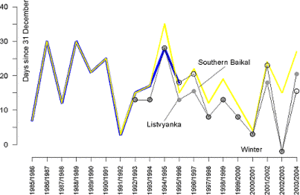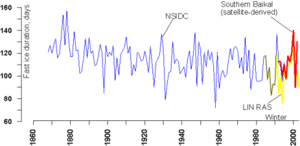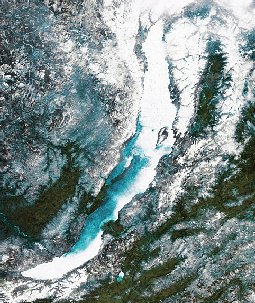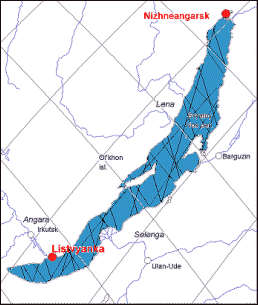Ice on Lake Baikal
Image of the month - May 2006
The date when a lake is frozen, or freed by ice are major climate indicators. Lake Baikal is the deepest and biggest lake in the world (it contains 20 % of fresh water on Earth excluding glaciers), with specific fauna and flora. Ice cover influences such physical water parameters as its transparency, temperature, turbulence, water stratification, currents, etc., as well as primary production and spring diatoms blooms. Moreover, its iced surface is used as a road in winter, with thus an economic impact of such information.
The lake ice cover can be studied using simultaneously the power received by the radar altimeters after reflection on the surface (backscatter coefficient) in Ku band and the brightness temperature from the bi-frequency radiometers onboard Topex/Poseidon, Jason-1, Envisat and GFO, combined with passive microwave measurements (like those of SSM/I). Comparing these two kinds of information, it is possible to determine the type of surface - ice or water.
The data obtained on the basis this information (i.e. dates when the lake is completely frozen, when the ice breaks up, and fast-ice duration) match well the in situ observations, unfortunately scarcer and scarcer (and more difficult to access).


Baikal Lake freeze-up date evolution (in days after December 31st), and fast-ice duration. In yellow and blue, historical in situ measurements (NSIDC: National Snow and Ice Data Center, Boulder, Colorado, USA; LIN RAS: Limnological Institute of Russian Academy of Sciences, Irkutsk, Russie); in black, satellite measurements for the southern part of the lake, and for the Listvyanka station (also in the southern part). From the beginning of the in situ measurement series, the winter duration is decreasing; however, recent data show a trend towards cooling, and longer winters. (Credits Legos)
See also:
- Applications: Ice
- Applications: Hydrology and land
Websites on this subject:
References:
- Kouraev A.V., S.V. Semovski, M.N.Shimaraev, N.M. Mognard, B. Legresy, F. Remy. "Ice regime of lake Baikal from historical and satellite data: Influence of thermal and dynamic factors". Limnology and Oceanography, (submitted).
- Kouraev A.V., S.V. Semovski, M.N.Shimaraev, N.M. Mognard, B. Legresy, F. Remy. "Observations of lake Baikal ice from satellite altimetry and radiometry". Remote Sensing of Environment, (submitted).






